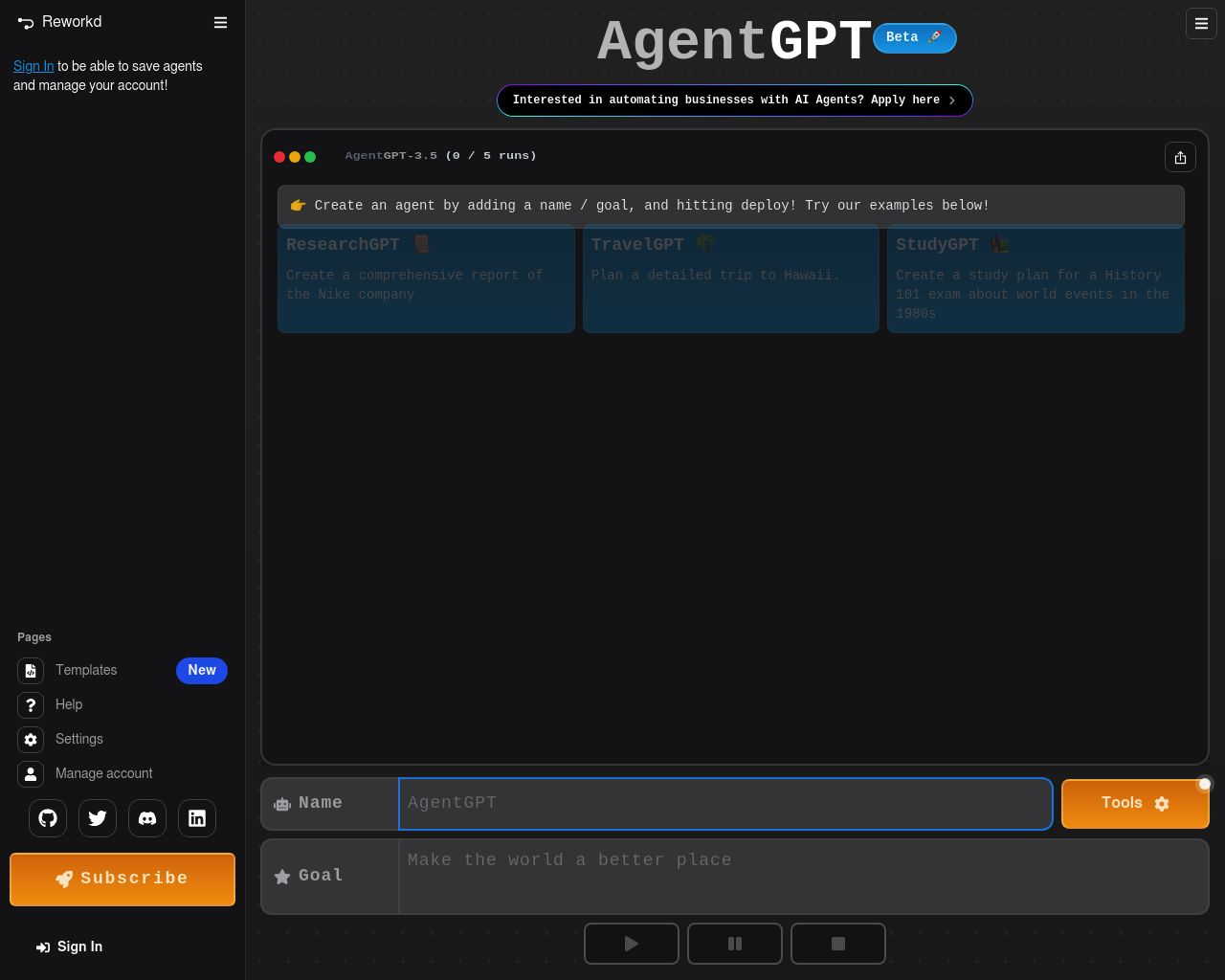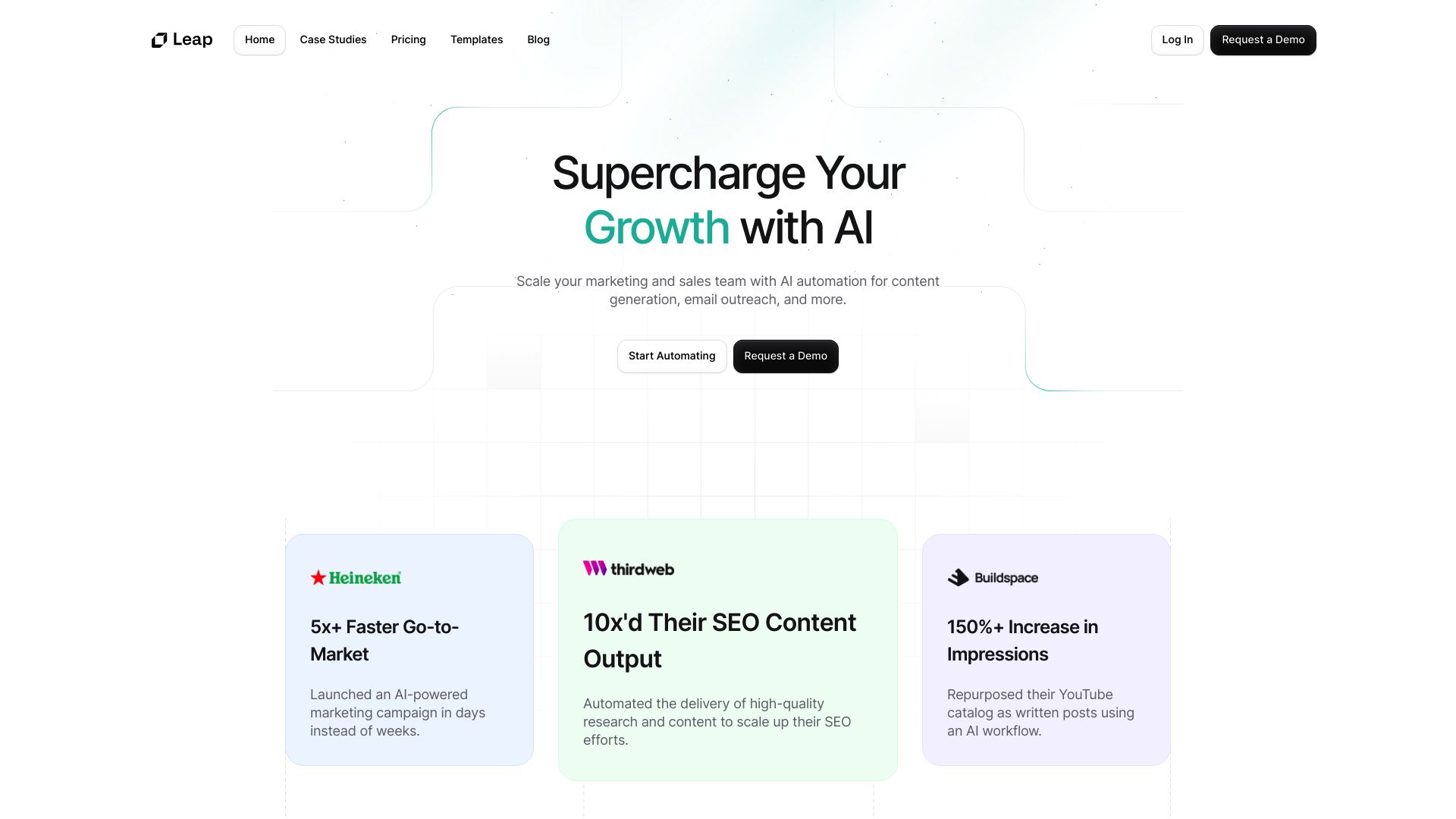AgentGPT vs. Leap AI: Comparing Top AI Development Platforms
AI platforms revolutionize business operations, but choosing the right solution can be daunting. This comparison explores AgentGPT and Leap AI, two distinct approaches to AI agent development. AgentGPT offers autonomous, goal-oriented AI agents with robust memory management, while Leap AI provides a no-code interface for rapid AI workflow creation. We’ll examine their core features, strengths, and limitations to help you determine which platform best suits your needs. Whether you’re a developer seeking advanced AI capabilities or a business user looking for accessible AI tools, this analysis will guide your decision-making process. We’ll also introduce SmythOS, a comprehensive AI solution that combines the best of both worlds, offering unparalleled versatility and security for enterprise-level deployments.
AgentGPT Overview
AgentGPT empowers users to create and deploy customizable AI agents directly in a web environment. Unlike traditional chatbots, these agents tackle broad, goal-oriented tasks autonomously. The platform stands out with its vector database-powered memory management, allowing agents to retain execution history and access long-term memory.
AgentGPT empowers users to create and deploy customizable AI agents directly in a web environment. Unlike traditional chatbots, these agents tackle broad, goal-oriented tasks autonomously.


AgentGPT offers robust features including user authentication, agent run saving and sharing, dynamic translations, and AI model customization. Web browsing capabilities enhance agent functionality, while Stripe integration supports a paid version with expanded features. The platform’s Docker-based setup allows for local runs without API keys, ensuring accessibility for developers.
AgentGPT offers robust features including user authentication, agent run saving and sharing, dynamic translations, and AI model customization.
Scalability stands as a key strength of AgentGPT, with its cloud offering seamlessly integrating tools like LangChain. This makes it suitable for both individual developers and large-scale enterprise deployments. However, the platform lacks some advanced features found in competitors, such as a visual builder or no-code editor, which may limit its appeal to non-technical users.
AgentGPT’s commitment to open-source development fosters a collaborative community, driving continuous improvement and innovation. This approach aligns with the platform’s vision of democratizing AI technology, making advanced tools accessible to a wider audience. While AgentGPT excels in autonomous task execution and memory management, users seeking more specialized features like multimodal interactions or advanced debugging tools may find the platform somewhat limited.
Leap AI Overview
Leap AI empowers users to create sophisticated AI workflows without coding expertise. The platform’s no-code interface allows rapid development of AI-powered applications, from text generation to image creation and music production.


Leap AI’s strength lies in its versatility and ease of use. The platform offers a comprehensive SDK supporting RESTful API, TypeScript, and Python, facilitating seamless integration into various applications. Users can leverage an extensive template library to jumpstart their projects, whether creating blog posts, generating music, or summarizing leads.
Leap AI’s strength lies in its versatility and ease of use… Users can leverage an extensive template library to jumpstart their projects, whether creating blog posts, generating music, or summarizing leads.
The platform supports a wide array of AI models, including OpenAI GPT, Mistral 7b, Claude 3 Opus, and Stable Diffusion XL. This diversity enables users to tackle a broad spectrum of tasks efficiently. Leap AI also shines in its integration capabilities, connecting effortlessly with popular tools like Slack, Hubspot, Zendesk, and Zapier.
One of Leap AI’s standout features is its AI model training capability. Users can fine-tune and train custom models using their datasets, enhancing the specificity and accuracy of AI outputs. This feature proves particularly valuable for businesses seeking to create tailored AI solutions for their unique needs.
Users can fine-tune and train custom models using their datasets, enhancing the specificity and accuracy of AI outputs.
While Leap AI offers impressive functionality, it may present a learning curve for users new to AI workflows. The platform’s emphasis on quick deployment and integration might also mean less granular control over certain aspects of AI behavior compared to more developer-focused platforms.
Feature Comparison
AgentGPT and Leap AI offer distinct approaches to AI agent development, with notable differences in their core components and security features. AgentGPT excels in autonomous agent execution and memory management, leveraging vector databases for task history retention. This platform enables goal-oriented AI agents to tackle broad tasks independently. However, AgentGPT lacks a visual builder or no-code editor, potentially limiting its accessibility to non-technical users.
In contrast, Leap AI provides a no-code interface for AI workflow creation, making it more approachable for users without coding expertise. Leap AI’s strength lies in its versatility, offering an extensive template library and support for various AI models. While AgentGPT focuses on autonomous task execution, Leap AI emphasizes rapid development of AI-powered applications across multiple domains.
Regarding security, AgentGPT implements OAuth authentication but lacks explicit mentions of data encryption or IP control. Leap AI’s documentation does not provide detailed information on its security measures, highlighting a potential gap in both platforms’ feature sets compared to more comprehensive solutions like SmythOS, which offers robust security features including data encryption and constrained alignment.
Feature Comparison Table
| AgentGPT | Leap AI | SmythOS | |
|---|---|---|---|
| CORE FEATURES | |||
| Hosted Agents (Dev, Production) | ✅ | ❌ | ✅ |
| Visual Builder | ❌ | ✅ | ✅ |
| No-Code Options | ❌ | ✅ | ✅ |
| Autonomous Agents | ✅ | ❌ | ✅ |
| Explainability & Transparency | ❌ | ❌ | ✅ |
| Debug Tools | ✅ | ❌ | ✅ |
| Multi-Agent Collaboration | ✅ | ❌ | ✅ |
| Human-AI Interaction | ❌ | ✅ | ✅ |
| SECURITY | |||
| Constrained Alignment | ❌ | ❌ | ✅ |
| IP Control | ❌ | ✅ | ✅ |
| COMPONENTS | |||
| Foundation AIs | ❌ | ✅ | ✅ |
| Data Lakes | ❌ | ❌ | ✅ |
| DEPLOYMENT OPTIONS (EMBODIMENTS) | |||
| Staging Domains | ❌ | ✅ | ✅ |
| Production Domains | ❌ | ✅ | ✅ |
| Deploy as Scheduled Agent | ❌ | ✅ | ✅ |
| DATA LAKE SUPPORT | |||
| Hosted Vector Database | ✅ | ❌ | ✅ |
| Sitemap Crawler | ❌ | ✅ | ✅ |
| YouTube Transcript Crawler | ❌ | ✅ | ✅ |
Best Alternative to AgentGPT and Leap AI
SmythOS stands out as the superior alternative to AgentGPT and Leap AI for creating and deploying AI agents. Our platform combines powerful capabilities with unmatched ease of use, offering a comprehensive solution for businesses and developers. SmythOS features a robust drag-and-drop interface that simplifies agent creation without sacrificing functionality. Unlike AgentGPT’s focus on autonomous execution or Leap AI’s emphasis on no-code workflows, we provide a balanced approach that caters to both technical and non-technical users.
SmythOS stands out as the superior alternative to AgentGPT and Leap AI for creating and deploying AI agents. Our platform combines powerful capabilities with unmatched ease of use…
Our platform excels in critical areas where AgentGPT and Leap AI fall short. SmythOS offers hosted agents for both development and production environments, ensuring seamless deployment across different stages. We provide advanced debugging tools and explainability features, addressing the transparency concerns present in competing platforms. SmythOS also supports multi-agent collaboration, enabling complex task execution that surpasses the capabilities of individual agents in AgentGPT or Leap AI.
Security is a top priority for SmythOS. We implement robust measures like data encryption and constrained alignment, features notably absent or undocumented in AgentGPT and Leap AI. This commitment to security makes SmythOS the ideal choice for businesses handling sensitive data or requiring strict compliance.
SmythOS offers unparalleled flexibility in deployment options. Our agents can be deployed as APIs, webhooks, scheduled tasks, or integrated into existing systems. This versatility, combined with our extensive integration ecosystem, allows for seamless incorporation of AI agents into diverse workflows and business processes. Whether you’re building a customer service chatbot, automating data analysis, or creating intelligent workflow assistants, SmythOS provides the tools and capabilities to bring your vision to life efficiently and effectively.
In summary, SmythOS emerges as the best alternative by offering a complete package of features, security, and ease of use that outshines both AgentGPT and Leap AI. Our platform empowers users to create sophisticated AI agents quickly, deploy them securely, and scale effortlessly – all within a single, intuitive environment. Choose SmythOS to unlock the full potential of AI automation for your business.
Conclusion
AgentGPT and Leap AI offer distinct approaches to AI agent development, each with unique strengths. AgentGPT excels in autonomous task execution and memory management, making it suitable for developers seeking goal-oriented AI solutions. Leap AI, with its no-code interface and versatile template library, caters to users looking for rapid AI application development across various domains.
While both platforms have their merits, SmythOS emerges as the superior choice for businesses and developers seeking a comprehensive AI solution. Our platform combines the best of both worlds, offering autonomous agent capabilities, a user-friendly visual builder, and extensive integration options. SmythOS’s drag-and-drop interface allows for complex AI workflow creation without sacrificing power or flexibility.
Unlike AgentGPT and Leap AI, SmythOS provides robust security features, including data encryption and constrained alignment, making it ideal for enterprise-level deployments. Our platform’s scalability, coupled with its ability to deploy agents as APIs, webhooks, or chatbots, offers unparalleled versatility in implementation.
We invite you to experience the future of AI development with SmythOS. Create a free account today and discover how our platform can revolutionize your AI workflows. With our extensive integration ecosystem and versatile deployment options, SmythOS is poised to transform your business processes and drive innovation. Don’t just adapt to the AI revolution – lead it with SmythOS.
Last updated:
Disclaimer: The information presented in this article is for general informational purposes only and is provided as is. While we strive to keep the content up-to-date and accurate, we make no representations or warranties of any kind, express or implied, about the completeness, accuracy, reliability, suitability, or availability of the information contained in this article.
Any reliance you place on such information is strictly at your own risk. We reserve the right to make additions, deletions, or modifications to the contents of this article at any time without prior notice.
In no event will we be liable for any loss or damage including without limitation, indirect or consequential loss or damage, or any loss or damage whatsoever arising from loss of data, profits, or any other loss not specified herein arising out of, or in connection with, the use of this article.
Despite our best efforts, this article may contain oversights, errors, or omissions. If you notice any inaccuracies or have concerns about the content, please report them through our content feedback form. Your input helps us maintain the quality and reliability of our information.
